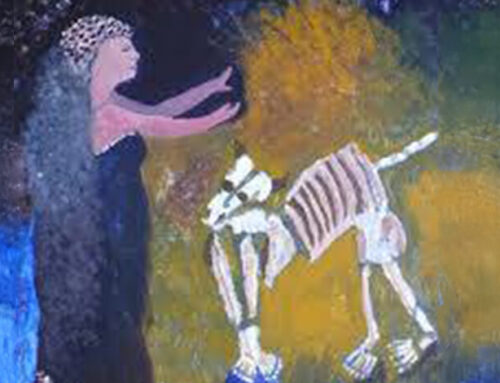Freezing and, thinking like a Stoic
Is this what I was created for? To huddle under the blankets and stay warm?”
Marcus Aurelius, Stoic and Roman emperor

Visit from a polar vortex
This January, we had a face-chewing, bitterly frigid visit from a polar vortex. Wildlife disappeared, huddled in their dens and nests. Vehicles quit unexpectedly or did not start at all; electronics did strange things; extension cords snapped; home heating systems faltered; plumbing pipes froze. We had scary alerts of power shortages and wondered how and if we would get through without damage to our homes. We were grateful we had homes. It was both tempting and a reasonable decision to stay in our warm bed.
But we cannot stay in bed, and we should not choose to be so passive in our lives. In usual life circumstances, and as hard as it can be, if we do not leave our beds, our lives will be messier, less satisfying and we will miss out. Instead, we can infuse our life with awareness about what we believe is important and how we want to spend our life. We can wake up.
Cognitive behavioural therapy
Marcus Aurelius was a Stoic philosopher and a Roman Emperor. He is considered a model Stoic*. Stoics believed we should cultivate ruggedness or toughness for inevitable future hardship that is part of life. (He also said we should learn to notice and appreciate small things). Aurelius has been referenced as one of the originators of Cognitive Behavioural Therapy (CBT), a therapy that asks you to examine and challenge your thinking.
CBT is based on the premise that your thoughts, feelings, and actions influence each other. How you think about things is very important, because your thoughts are not always an accurate reflection of reality. Examine your thoughts and ask yourself: Is that really true? Faulty thinking is common and includes thinking errors like fortune telling (I am never going to get a job in my field) or magnification (This is the worst thing that could happen) when we don’t have all the information or a complete picture. We can talk to others, look for other wisdom (like Aurelius’s teachings), and invite a different perspective. This can help us get to more accurate or clearer thinking. What would someone you respect, even if they are no longer alive, say about the situation?
A sampling of Stoic teaching
Aurelius also wrote about acceptance of people and our “fate”. A sample Stoic teaching is to expect other people to be irritating and even obnoxious. The Stoics say when we are confronted with people or events that are not ideal, we can choose equanimity—calmness and composure. This is not easy. The best of us gets ragged–we lose our temper, speak sharply, rudely or harshly, or we may find ourselves sobbing at the smallest “last straw” event.
We can get better at handling these situations if we train ourselves to first stop, slow down, and take a break from the situation if our emotion is running high. Sometimes, we will first have to manage or release the emotion in a healthy way before the thinking part of our brain can go to work. Ruminating about the situation and how bad the other person is, how unfair the situation is, or other things outside of our control is not helpful. Rather, we need to work hard to focus on any flawed or unhelpful thinking on our part and challenge ourselves to do better.
Stoics also expressed a specific set of virtues, which we can think of more generally, as what we hold to be important, or values. How do you want to walk through the world? How do you want to be remembered? Do you think family, friendships, community, hard work, contribution, honesty, faith, kindness, generosity, temperance, a sense of humour, and joyfulness are important? What else? What is your most important guiding value?
Embrace your life
How we are in the world illustrates our values, and we are most happy when we come closest to living our values. So, if sadness takes over based on unexamined thinking, it is not likely we can live a value of contribution or joyfulness. This then adds another layer of sadness because we are not living a life that is true to us.
“Think of the life you have lived until now as over, and as a dead man, see what’s left as a bonus and live it according to nature. Love the hand that fate deals you and play it as your own, for what could be more fitting?”
Here Aurelius tells us to “play it as your own.” Embrace your life, live your values, and be yourself. Think about using your gifts and strengths to better others’ lives. This can deliver peace. We know we did the best we could to live well. And we showed up for ourselves and the people in our life. We got out of bed.
*If you want to learn more about Stoicism, here’s a place to start: htttps://dailystoic.com
Greenwich Counselling Services
Stony Plain



